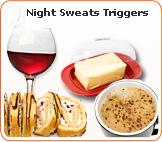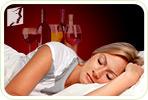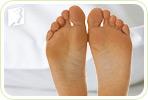
Night sweats, also known as nocturnal hyperhidrosis, are the body's reaction to a perceived episode of overheating. They are characterized by a sudden onset of excess perspiration as the body attempts to cool itself down. Night sweats have a range of causes, but one of the most common is hormonal changes during menopause.
Night sweats often occur in menopausal and pregnant women because of the rapid fluctuation in estrogen levels that occurs during these times. When the hypothalamus, the part of the brain responsible for regulating body temperature, incorrectly senses that the body temperature is too high, it signals the body to disperse heat immediately. Heat exits the body, and sweating typically follows: when this happens during sleep, it is known as a night sweat.
Night Sweat Triggers
Although hormonal changes during menopause may cause night sweats, night sweats can be triggered or made worse by other habits or lifestyle choices. These include:

- Spicy food. Eating spicy food, especially in the hours before going to bed, can trigger night sweats.
- Inactivity. Sedentary women are much more susceptible to night sweats than women who exercise regularly.
- Sleeping environment conducive to night sweats. Too many or too-heavy blankets, a too-high room temperature, or pajamas that don't wick away moisture from the body can increase the intensity of night sweats
- Stress. Women with high levels of stress or those who suffer from anxiety or depression experience night sweats more frequently.
These are not the only reasons for night sweats, but are some of the most common. However, there are steps a woman can take to reduce her risk factors and lessen the frequency and intensity of her night sweats.
Solutions for Night Sweats
Every woman's body is different and reacts differently to treatments. This means that the same treatments do not have the same effectiveness for all women. The most common solutions to night sweats are:

- Cutting back on spicy food
- Getting enough sleep
- Exercising regularly
- Taking a cool shower before bed
- Sleeping in a cool area, with light sheets and blankets made of natural fibers
- Taking herbal remedies
- Keeping a cool glass of water to sip on by your bedside
Herbal remedies have had mixed results. Many women find them helpful, but most research shows that herbal remedies are no better than a placebo when treating night sweats. It is also a good idea to talk to your doctor before starting an herbal regimen because even natural medicine can have side effects and interact with the medication you are already taking.
Another option for treating night sweats and other menopausal symptoms - such as hot flashes, mood swings, and vaginal dryness - is hormone replacement therapy (HRT). This treatment increases the amount of estrogen in a woman's body, which helps to control the frequency and severity of night sweats. However, HRT does have its risks and contraindications, so it is a good idea to talk to your doctor about what treatment for night sweats is best for you.
Sources
- American Osteopathic Association. (2015). Don't Lose Sleep Over Night Sweats. Retrieved November 6, 2015, from http://www.osteopathic.org/osteopathic-health/about-your-health/health-conditions-library/general-health/Pages/night-sweats.aspx
- Mayo Clinic Staff. (2014). Night Sweats. Retrieved November 6, 2015, from http://www.mayoclinic.org/symptoms/night-sweats/basics/causes/sym-20050768



